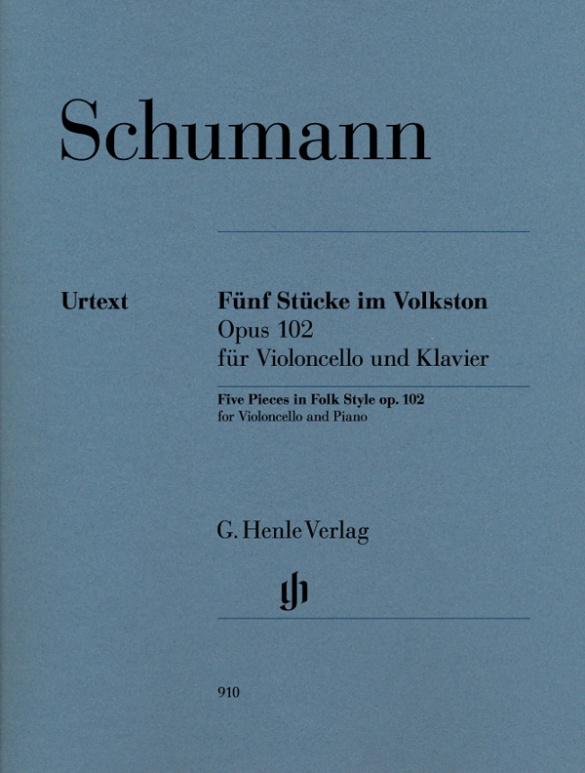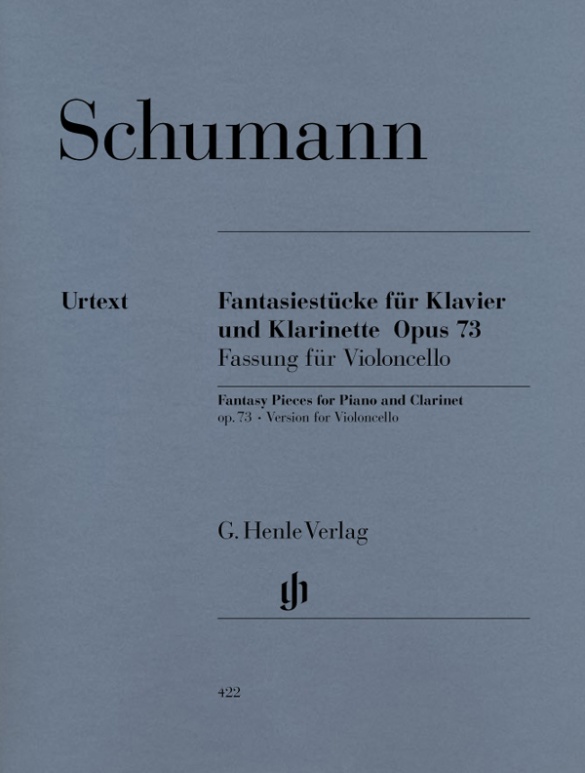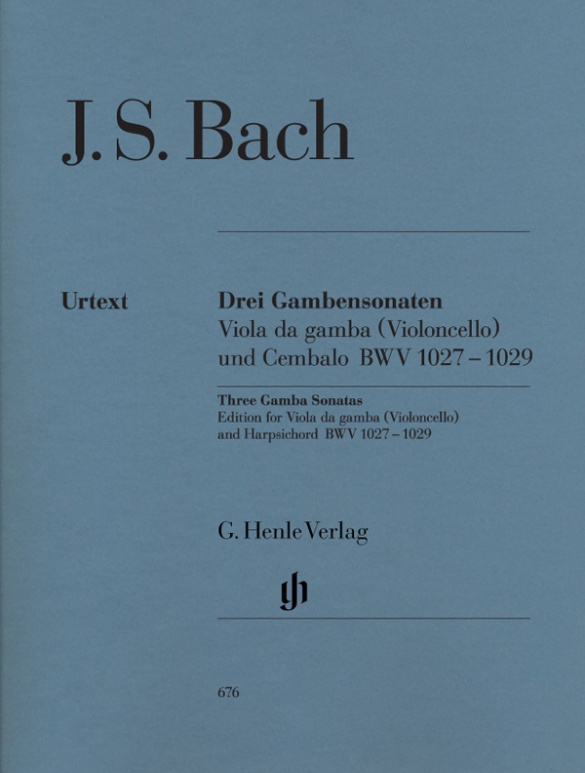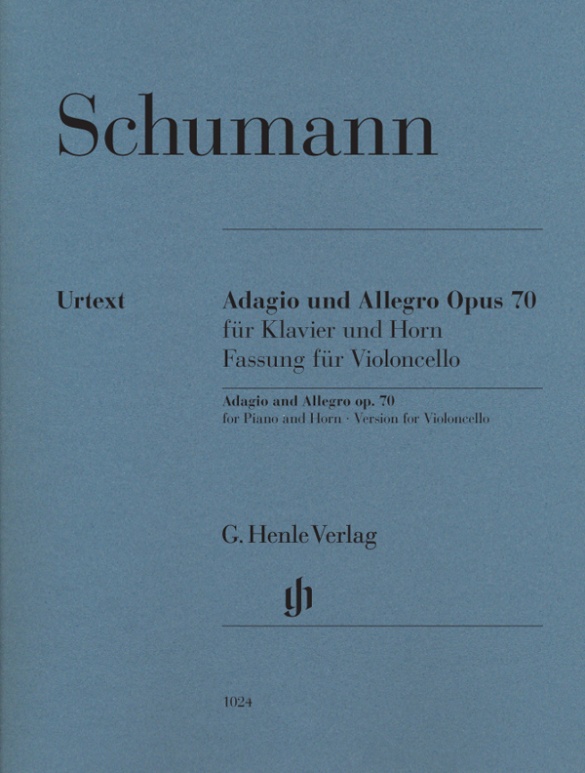

Robert Schumann
Adagio et Allegro op. 70 pour piano et cor
En 1849, Schumann se tourna vers un nouveau genre: la composition d’oeuvres pour piano accompagné d’un instrument soliste. De manière presque systématique, il fit cadeau de Fantasiestücken, Romanzen, etc. aux différents instruments à vent - et prévit toujours aussi une variante avec un instrument à cordes. Ainsi, selon son souhait, l’Adagio et Allegro op. 70 existe également dans une version pour piano et violoncelle. Clara joua la nouvelle oeuvre, accompagnée du corniste E. Julius Schlitterlau, rapportant ensuite dans son journal: «L’oeuvre est superbe, d’une grande fraîcheur et passionnée, ainsi que je les aime tant!» Enthousiaste, Schumann proclama aussi «y avoir eu beaucoup de plaisir», ce en quoi de nombreux musiciens le rejoignent encore aujourd’hui.
CONTENU/DÉTAILS
(Explanation)
Exclusively in the Henle Library APP
Doigté de: Wolfgang Emanuel Schmidt
CONCERNANT LE COMPOSITEUR
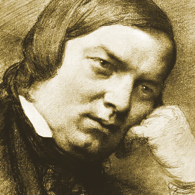
Robert Schumann
Son œuvre est marquée par le concept de la musique poétique qu’il a lui-même forgé et qui tend à une fusion de la littérature et de la musique. Ses pièces lyriques pour piano composées jusqu’en 1839 en sont tout particulièrement exemplaires. Il s’est ensuite consacré à d’autres genres (lied, symphonie et musique de chambre entre autres).
| 1810 | Né à Zwickau le 8 juin, fils d’un libraire. |
| à partir de 1828 | Études de droit à Leipzig, cours de piano auprès de Friedrich Wieck. Se décide pour une carrière de musicien. |
| 1830–39 | Compose exclusivement des œuvres pour piano, surtout des cycles, entre autres: «Papillons» op. 2 (1829-32), «Carnaval» op. 9 (1834/35), «Davidsbündlertänze» op. 6 (1837), «Scènes d’enfants» op. 15 (1837/38), «Kreisleriania» op. 16 (1838), «Novelettes» op. 21 (1838). |
| 1832 | Une paralysie partielle de la main droite rend impossible une carrière de pianiste. 1833 Fondation de la confrérie imaginaire du «Davidsbund». |
| 1835–44 | Dirige la Neue Zeitschrift für Musik (Nouveau Journal pour la Musique). |
| 1840 | Mariage avec Clara Wieck; 138 lieder parmi lesquels le Liederkreis op. 39 sur des poèmes d’Eichendorff, le cycle de lieder «Dichterliebe» op. 48. |
| 1841 | 1re Symphonie en Si bémol majeur («Symphonie du Printemps») op. 38 et 4e Symphonie en Ré mineur op. 120. |
| 1842 | 3e Quatuor à cordes op. 41; autres œuvres de musique de chambre. |
| 1843 | Professeur de composition au conservatoire de Leipzig. Oratorio «Le Paradis et la Péri» op. 50. |
| 1845 | Il s’installe à Dresde. Voyage en Russie. |
| 1845 | Concerto pour piano en La Mineur op. 54, 2e Symphonie en Ut majeur op. 61. |
| 1850 | Directeur général de la musique à Düsseldorf. Création à Leipzig de l’opéra «Genoveva» op. 81. Symphonie en Mi bémol majeur («Rhénane») op. 97; concerto pour violoncelle en La mineur op. 129. |
| 1854 | Naissance d’une amitié avec Brahms. Achèvement des Scènes de Faust. Concerto pour violon en Ré mineur pour Joseph Joachim. |
| 1854 | Tentative de suicide et hospitalisation à la clinique psychiatrique d’Endenich. |
| 1856 | Meurt le 29 juillet à Endenich près de Bonn. |
About the Authors

Ernst Herttrich (Editeur)
Dr. Ernst Herttrich, born in 1942 in Würzburg, read musicology, history, German and theology at the universities in Würzburg and Cologne. In 1970 he earned his doctorate in Würzburg with a study of the expression of melancholy in the music of Mozart.
From 1970 to 1990 he was an editor at G. Henle Publishers in Munich, after which he was Head of the Beethoven Complete Edition for over 15 years. In 1999 he took over as Head of the Beethoven-Haus Publishers, and from 2001 was made Head of the Beethoven-Archiv, the research centre at the Beethoven-Haus.
He has been a visiting professor at Meiji Gakuin University in Tokyo and has undertaken several lecture tours both there and to Kyoto. His research interests include source studies, editorial techniques and music history. Herttrich’s publications include “Beethoven. Liederkreis an die ferne Geliebte” (Bonn 1999) and “Ludwig van Beethoven. Biographie in Bildern” (Bonn, 2000). Herttrich has edited over 100 Urtext editions for G. Henle Publishers.

Klaus Schilde (Doigtés)
Prof. Klaus Schilde, born in 1926, spent his childhood in Dresden. There he was greatly influenced by Walter Engel, who taught him the piano (Kodaly method), composition and violin. From 1946–1948 he studied at the music conservatory in Leipzig with Hugo Steurer. After moving to the west in 1952 he studied with Walter Gieseking and Edwin Fischer, as well as with Marguerite Long, Lucette Descaves and Nadia Boulanger in Paris.
Schilde won numerous prizes. From 1947 onwards he gave concerts as a soloist and chamber musician on almost every single continent with renowned orchestras. He taught at the music conservatories in East Berlin Detmold, West Berlin, Munich, Tokyo (Geidai) and Weimar. From 1988–1991 he was President of the Staatliche Hochschule für Musik und Theater in Munich, where he also taught for decades as a professor. There are numerous radio and television broadcasts with Klaus Schilde as well as CD recordings. Schilde has contributed fingerings to almost 100 Henle Urtext editions.
Prof. Klaus Schilde passed away on 10 December, 2020.
Informations sur la sécurité du produit

G. Henle Verlag
Vous trouverez ici des informations sur le fabricant du produit.G. Henle Verlag e.K.
Forstenrieder Allee 122
81476 München
Allemagne
info@henle.de
www.henle.com
In keeping with Henle's reputation, this cello score is, first, an informative reference edition. The preface includes historical context for the composition and its first publication. This information is accompanied by carefully notated comments about choices made from the manuscript. ... Most important, though, is the inclusion of the original phrase markings, as they reveal the natural arch of the horn line rather than phrases hacked by edited bowings. Suggested bowings and fingerings are added cleverly and unobtrusively. With the purchase price only minimally above or equal to other publishers, this new Schumann edition is an important choice for any cellist's music library.
Strings, 2012Die Ausgaben sind mit größter Sorgfalt und in gewohnt hochwertiger Ausstattung hergestellt und bieten auch eine Bereicherung für den Notenschrank des interessierten, praktisch musizierenden Liebhabers.
Robert Schumann Gesellschaft Correspondenz, 2012recommandations
autogenerated_cross_selling
Autres éditions de ce titre
Autres éditions de ce titre


